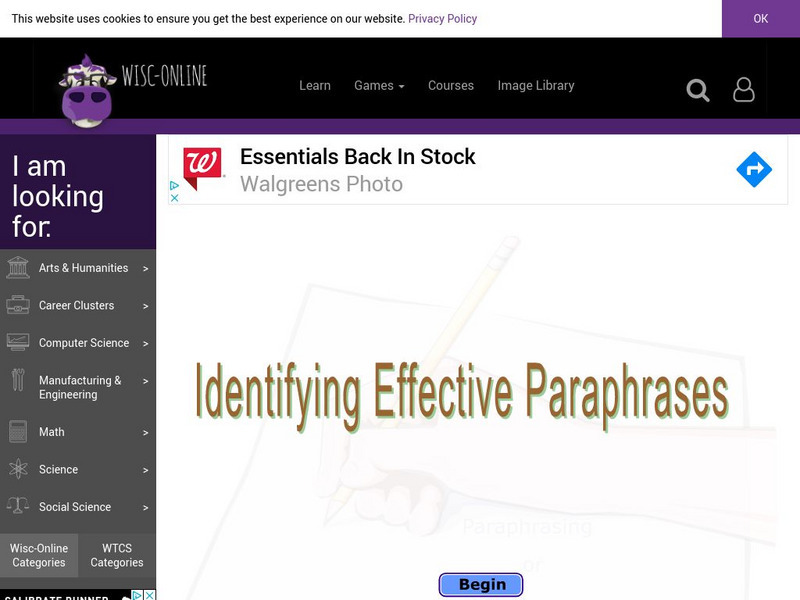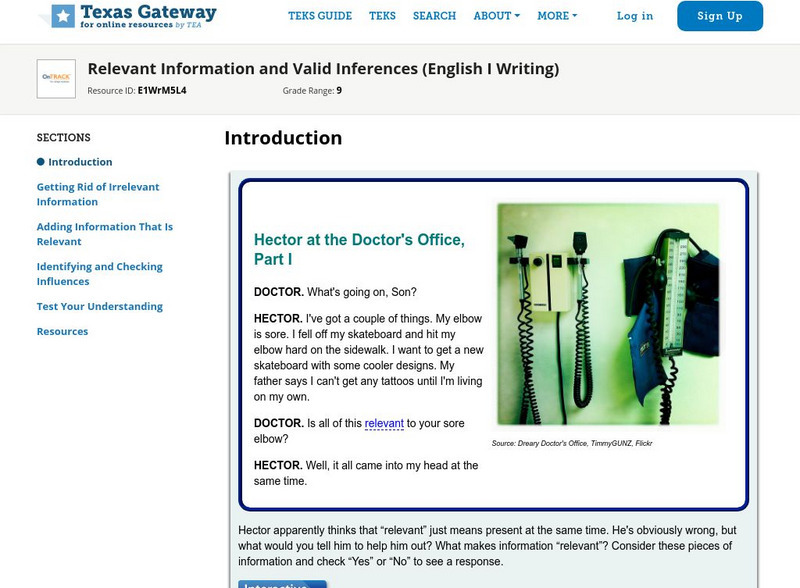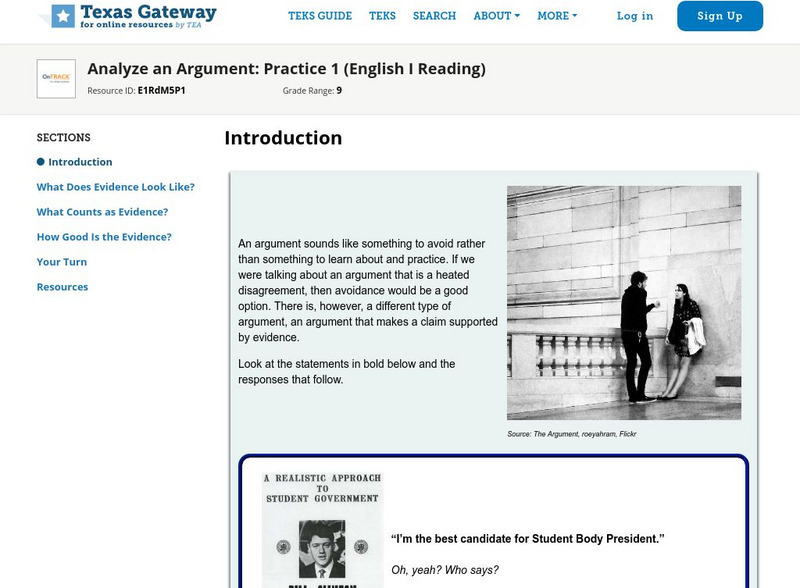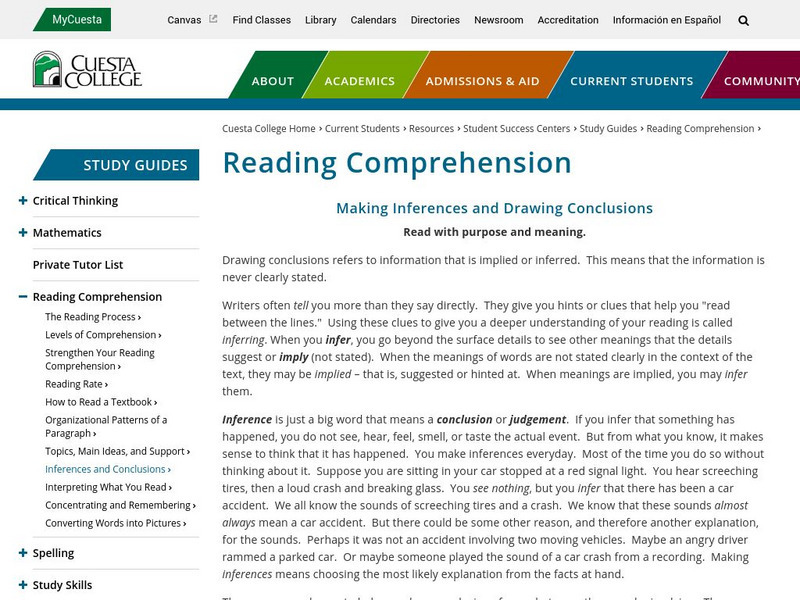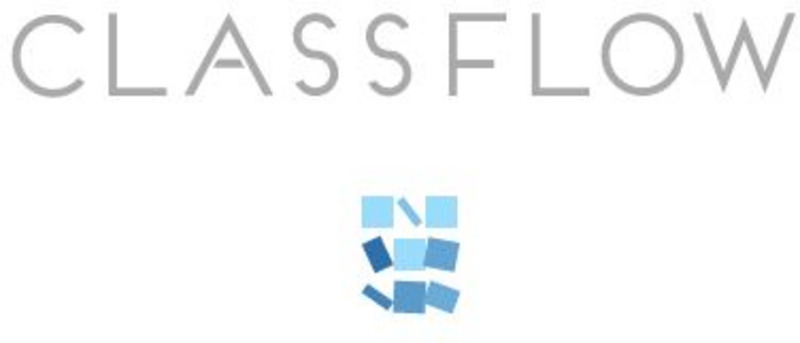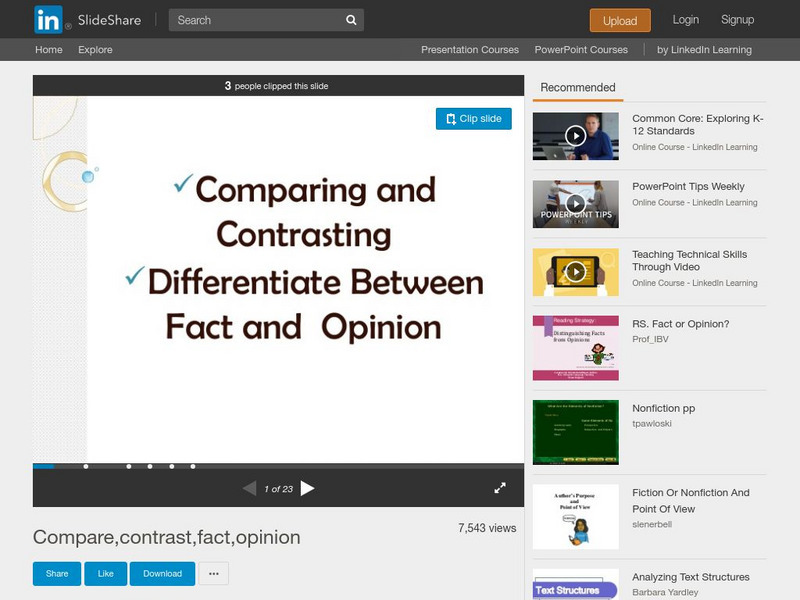Wisc-Online
Wisc Online: Identifying Acceptable Paraphrases
This learning module defines paraphrasing and discusses how to paraphase, and then they identify acceptable paraphrases of source material.
Quizlet
Quizlet: Elements of an Argument Test
Argument essay terms are included on this test over the following words: argument, claim, support, reasons, evidence, and counterargument. Six multiple choice questions are provided on this assessment.
Texas Education Agency
Texas Gateway: Relevant Information and Valid Inferences (English I Writing)
[Accessible by TX Educators. Free Registration/Login Required] An inference is a guess based on the information within a situation. It is valid if the guess is logical. This lesson teaches you how to check a completed draft for relevant...
Texas Education Agency
Texas Gateway: Analysis of Relative Values of Specific Data, Facts, and Ideas
[Accessible by TX Educators. Free Registration/Login Required] In this lesson we will talk about reviewing the facts and data you use to support your arguments and assessing the reliability of the sources you use.
Texas Education Agency
Texas Gateway: Relevant Information and Valid Inferences
[Accessible by TX Educators. Free Registration/Login Required] In this lesson, you will learn how to make the information in your expository essays relevant and your inferences valid.
Texas Education Agency
Texas Gateway: Analyze Literary Essays' Inclusion of Personal Opinions and Facts
In this lesson, you will learn how to identify and discuss the use of facts, personal examples, and ideas and how they are woven into a literary essay.
Texas Education Agency
Texas Gateway: Analyze an Argument: Practice 1 (English I Reading)
In this lesson, you are going to practice analyzing the evidence that supports or opposes an argument. You are also going to learn to analyze the quality, relevance, and credibility of the evidence so you can decide whether to accept the...
Other
Tidewater Community College: Book or Article Review or Critique Guidelines
Many students are not sure what type of information to include in a book or article review. This site provides some general guidelines. It covers not only the type of content to be included but also the format.
Other
Blackboard: Author's Point of View (Attitude and Tone)
Learn about author's attitude and tone, and see examples of tone used to convey nostalgia, cynicism, and sentiment in a text. This is an excellent resource for helping students identify key words and phrases that give clues about the...
Other
Park View Middle School: Mrs. Marro Sports Argument Writing
Numerous resources are provided to support the instruction of the argument essay.
Houghton Mifflin Harcourt
Holt, Rinehart and Winston: Writer's Guide: Persuasive Essay
Follow the framework on this page to construct a persuasive essay on any topic. Click on Writer's Model in the upper right to see a Shockwave presentation highlighting how to use the suggestions. W.9-10.10 Write Routinely
Other
Gallaudet University: English Works: Guide to Different Types of Essays
English Works site has suggestions on how to write an essay to convey helpful information. This site offers examples of eight different types of essays and graphic organizers.
Quia
Quia: Making Inferences, Summaries, and Conclusions
Read a short text and then choose the correct inference, summary, or conclusion in this Rags to Riches style game.
Other
Cuesta College: Reading Comprehension Guide: Inferences and Conclusions
Explanations and examples of inferences and conclusions in reading and in understanding context clues to define unknown vocabulary.
Science Education Resource Center at Carleton College
Serc: Why Should You Be Scientifically Literate?
In this lesson, students read, discuss, and analyze an article about the importance of scientific literacy, and develop an appreciation of the role science plays in their own lives.
TES Global
Blendspace: Argument Writing: Homework
A learning module with links to eight websites to use while writing an argumentative essay on how beneficial homework is.
Intel Corporation
Showing Evidence Tool: Analyzing and Evaluating Information
If you're looking for a way to engage students in analyzing and evaluating evidence, rather than simply piling up information, this tool may be a boon. Students can use it to construct an argument, rate the quality of resources, and...
University of Toronto (Canada)
University of Toronto: The Book Review or Article Critique
This site presents a series of questions to ask yourself before writing a book review or article critique. Most appropriate for non-fiction works.
ClassFlow
Class Flow: Writing a Persuasive Essay
[Free Registration/Login Required] This flipchart discusses the structure and procedure for writing a persuasive essay. Assessment questions are included.
ClassFlow
Class Flow: Fact and Opinion
[Free Registration/Login Required] Designed for grade 6, this flipchart covers the differences between fact and opinion. Students will analyze statements to determine if they are a fact or if they are an opinion.
ClassFlow
Class Flow: Fact or Opinion
[Free Registration/Login Required] This flipchart reviews the definitions of fact and opinion and gives the students opportunities to sort and identify fact and opinion statements.
Houghton Mifflin Harcourt
Holt, Rinehart and Winston: Elements of Literature: Historical/biographical Analysis Chart [Pdf]
A short graphic organizer which allows students to assess the historical and biographical influence on a piece of literature.
Houghton Mifflin Harcourt
Holt, Rinehart and Winston: Holt Assessment: Evaluating Nonfiction [Pdf]
This one-page printable worksheet is designed for classroom use in evaluating a reading of nonfiction. The evaluation is set up in a rubric format.
Tom Richey
Slide Share: Comparing and Contrasting: Differentiating Between Fact and Opinion
This downloadable slideshow focuses on comparing and contrasting, and distinguishing between fact and opinion. It provides definitions and examples of each.


